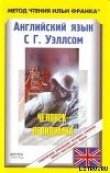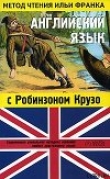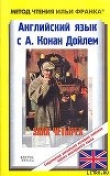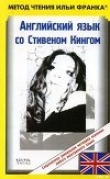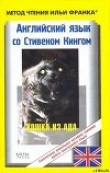
Текст книги "Английский язык с Шерлоком Холмсом. Собака Баскервилей (ASCII-IPA)"
Автор книги: Артур Конан Дойл
Соавторы: Илья Франк,Сергей Андреевский
Жанры:
Языкознание
,сообщить о нарушении
Текущая страница: 5 (всего у книги 38 страниц) [доступный отрывок для чтения: 14 страниц]
"Within the last few months (на протяжении последних «нескольких» месяцев) it became increasingly plain to me (мне все больше становилось ясным; to increase – возрастать) that Sir Charles's nervous system was strained to breaking point (что нервная система сэра Чарльза напряжена до предела; breaking point – критическое состояние). He had taken this legend which I have read you exceedingly to heart – so much (он настолько принимал близко к сердцу легенду, которую я вам прочел; exceedingly – весьма, сильно) so that, although he would walk in his own grounds (что, хотя он обычно прогуливался только в своем парке; grounds – сад, парк при доме), nothing would induce him (ничто бы не заставило его; to induce – побуждать; склонять) to go out upon the moor at night (выйти ночью на болота). Incredible as it may appear to you, Mr. Holmes (невероятно, как это может вам показаться, мистер Холмс), he was honestly convinced (/но/ он был искренне убежден) that a dreadful fate overhung his family (что страшное проклятие висело над его семьей; fate – судьба; to overhang – выступать над чем-либо, нависать; выдаваться, свешиваться; нависать, угрожать, грозить /чем-либо/), and certainly the records which he was able to give of his ancestors were not encouraging (и, конечно, примеры, которые он мог привести /из жизни/ своих предков, не ободряли: «не были ободряющими»; record – запись; исторический документ). The idea of some ghastly presence (мысль о чьем-то жутком присутствии) constantly haunted him (постоянно преследовала его), and on more than one occasion he has asked me (и частенько он спрашивал меня; on more than one – не раз; не единожды; occasion – возможность; случай, событие) whether I had on my medical journeys at night ever seen (не видал ли я когда-нибудь ночью по пути /к больному/; journey – путешествие; путь, маршрут) any strange creature or heard the baying of a hound (какого-нибудь странного существа и не слышал ли лая собаки). The latter question he put to me several times (последний вопрос он задавал мне несколько раз; to put – класть; ставить), and always with a voice which vibrated with excitement (и всегда голосом, дрожащим от волнения).
sparsely ['spA:slI], induce [In'dju:s], ghastly ['gA:stlI]
"The moor is very sparsely inhabited, and those who live near each other are thrown very much together. For this reason I saw a good deal of Sir Charles Baskerville. With the exception of Mr. Frankland, of Lafter Hall, and Mr. Stapleton, the naturalist, there are no other men of education within many miles. Sir Charles was a retiring man, but the chance of his illness brought us together, and a community of interests in science kept us so. He had brought back much scientific information from South Africa, and many a charming evening we have spent together discussing the comparative anatomy of the Bushman and the Hottentot.
"Within the last few months it became increasingly plain to me that Sir Charles's nervous system was strained to breaking point. He had taken this legend which I have read you exceedingly to heart – so much so that, although he would walk in his own grounds, nothing would induce him to go out upon the moor at night. Incredible as it may appear to you, Mr. Holmes, he was honestly convinced that a dreadful fate overhung his family, and certainly the records which he was able to give of his ancestors were not encouraging. The idea of some ghastly presence constantly haunted him, and on more than one occasion he has asked me whether I had on my medical journeys at night ever seen any strange creature or heard the baying of a hound. The latter question he put to me several times, and always with a voice which vibrated with excitement.
"I can well remember (я хорошо помню) driving up to his house in the evening (как подъехал вечером к его дому), some three weeks before the fatal event (недели за три перед роковым событием; some – около, приблизительно). He chanced to be at his hall door (он стоял: «ему случилось стоять» у двери в холл). I had descended from my gig (я сошел со своей двуколки) and was standing in front of him (и стоял перед ним), when I saw his eyes fix themselves over my shoulder (когда увидел его глаза, уставившиеся куда-то поверх моего плеча; to fix – устанавливать; устремить /взгляд/, уставиться), and stare past me (и смотрящие мимо меня) with an expression of the most dreadful horror (с выражением безмерного ужаса: «крайне страшного ужаса»). I whisked round (я быстро обернулся; to whisk – сметать; двигаться быстро, проворно; round – вокруг; назад) and had just time to catch a glimpse of something (и едва успел заметить, как что-то мелькнуло; time – время; мгновение; to catch – ловить; увидеть /мельком/) which I took to be a large black calf (что я принял за большого теленка) passing at the head of the drive (перешедшего противоположный конец аллеи; head – голова; начало). So excited and alarmed was he (он так был возбужден и встревожен) that I was compelled to go down to the spot (что я был вынужден пройти к тому месту) where the animal had been and look around for it (где я видел: «где было» это животное и поискать его; to look for – искать). It was gone, however (однако оно исчезло; to be gone – уходить; пропадать), and the incident appeared to make the worst impression upon his mind (и этот случай, видимо, произвел сильнейшее впечатление на него; worst – наихудший; mind – разум; настроение; to appear – показываться; казаться). I stayed with him all the evening (я оставался с ним /весь/ вечер), and it was on that occasion (и вот по тому случаю), to explain the emotion which he had shown (чтобы объяснить мне возбуждение, которое он выказал; to show – показывать), that he confided to my keeping that narrative (он доверил мне на сохранение тот рассказ = рукопись) which I read to you when first I came (которую я прочел вам, как только вошел; first – прежде всего). I mention this small episode (я упоминаю этот маленький эпизод) because it assumes some importance in view of the tragedy which followed (поскольку он приобрел некую значимость, принимая во внимание трагедию, которая последовала; to assume – принимать, брать на себя; in view – ввиду; принимая во внимание), but I was convinced at the time (но в то время я был убежден) that the matter was entirely trivial (что это дело совершенно незначительно = что все это сущая чепуха) and that his excitement had no justification (и что /все/ его волнения ничем не оправданы).
evening ['i:vnIN], event [I'vent], excitement [Ik'saItm@nt]
"I can well remember driving up to his house in the evening, some three weeks before the fatal event. He chanced to be at his hall door. I had descended from my gig and was standing in front of him, when I saw his eyes fix themselves over my shoulder, and stare past me with an expression of the most dreadful horror. I whisked round and had just time to catch a glimpse of something which I took to be a large black calf passing at the head of the drive. So excited and alarmed was he that I was compelled to go down to the spot where the animal had been and look around for it. It was gone, however, and the incident appeared to make the worst impression upon his mind. I stayed with him all the evening, and it was on that occasion, to explain the emotion which he had shown, that he confided to my keeping that narrative which I read to you when first I came. I mention this small episode because it assumes some importance in view of the tragedy which followed, but I was convinced at the time that the matter was entirely trivial and that his excitement had no justification.
"It was at my advice that Sir Charles was about to go to London (это по моему совету сэр Чарльз собирался поехать в Лондон; to be about – намереваться). His heart was, I knew, affected (как я знал, сердце у него пошаливало; to affect – оказывать воздействие; поражать /о болезни/), and the constant anxiety in which he lived (а постоянный страх, в котором он жил), however chimerical the cause of it might be (какой бы эфемерной ни была причина; chimerical – невыполнимый, неосуществимый), was evidently having a serious effect upon his health (несомненно, имел серьезное влияние на его здоровье). I thought that a few months among the distractions of town (я полагал, что несколько месяцев жизни в городе: «среди городских развлечений»; distraction – отвлечение внимания; развлечение) would send him back a new man (вернут его назад новым человеком; to send – посылать). Mr. Stapleton, a mutual friend (/наш/ общий друг, мистер Стэплтон) who was much concerned at his state of health (весьма встревоженный состоянием его здоровья), was of the same opinion (был того же мнения). At the last instant came this terrible catastrophe (в последний момент произошла эта ужасная трагедия; to come – приходить; происходить, случаться).
anxiety [&N'zaI@tI], mutual ['mju:tju@l], catastrophe [k@'t&strOfI]
"It was at my advice that Sir Charles was about to go to London. His heart was, I knew, affected, and the constant anxiety in which he lived, however chimerical the cause of it might be, was evidently having a serious effect upon his health. I thought that a few months among the distractions of town would send him back a new man. Mr. Stapleton, a mutual friend who was much concerned at his state of health, was of the same opinion. At the last instant came this terrible catastrophe.
"On the night of Sir Charles's death Barrymore the butler (в ночь смерти сэра Чарльза Бэрримор, дворецкий), who made the discovery (который обнаружил тело: «сделал открытие»; to discover – открывать; обнаруживать), sent Perkins the groom on horseback to me (послал конюха Перкинса верхом ко мне), and as I was sitting up late (а поскольку я поздно не ложился; to sit up late – засидеться допоздна) I was able to reach Baskerville Hall within an hour of the event (я смог прибыть в Баскервиль-холл в течение часа /после/ этого события). I checked and corroborated all the facts (я проверил и подтвердил все факты) which were mentioned at the inquest (которые были упомянуты на следствии). I followed the footsteps down the Yew Alley (я проследовал по /его/ следам вниз по тисовой аллее), I saw the spot at the moor-gate (осмотрел место у калитки, выходящей на болота) where he seemed to have waited (где он, по-видимому, ждал = останавливался), I remarked the change in the shape of the prints after that point (заметил, как изменили форму следы, /ведущие/ от этого места: «точки»), I noted that there were no other footsteps (я /также/ заметил, что не было никаких других следов) save those of Barrymore on the soft gravel (кроме следов Бэрримора на мягком гравии; save – за исключением, кроме), and finally I carefully examined the body (и, наконец, я внимательно осмотрел тело), which had not been touched until my arrival (которое не трогали до моего приезда).
discovery [dIs'kVv@rI], carefully ['kE@fullI], arrival [@'raIv(@)l]
"On the night of Sir Charles's death Barrymore the butler, who made the discovery, sent Perkins the groom on horseback to me, and as I was sitting up late I was able to reach Baskerville Hall within an hour of the event. I checked and corroborated all the facts which were mentioned at the inquest. I followed the footsteps down the Yew Alley, I saw the spot at the moor-gate where he seemed to have waited, I remarked the change in the shape of the prints after that point, I noted that there were no other footsteps save those of Barrymore on the soft gravel, and finally I carefully examined the body, which had not been touched until my arrival.
"Sir Charles lay on his face (сэр Чарльз лежал лицом вниз: «на своем лице»), his arms out, his fingers dug into the ground (раскинув руки с вонзенными в землю пальцами; to dig – копать; вонзать), and his features convulsed with some strong emotion to such an extent (а черты лица были до такой степени искажены каким-то сильным волнением) that I could hardly have sworn to his identity (что я едва смог опознать его личность; to swear to – давать показания под присягой; to swear – клясться; identity – идентичность; личность). There was certainly no physical injury of any kind (никаких физических повреждений на нем определенно не было). But one false statement was made by Barrymore at the inquest (но на следствии Бэрримор сделал одно ошибочное утверждение). He said that there were no traces (он сказал, что не было никаких следов) upon the ground round the body (на земле около тела). He did not observe any (он никаких /и/ не заметил). But I did (но заметил я) – some little distance off, but fresh and clear (немного в стороне, но свежие и отчетливые)."
"Footprints (следы)?"
"Footprints."
"A man's or a woman's (мужские или женские)?"
Dr. Mortimer looked strangely at us for an instant (доктор Мортимер мгновение странно смотрел на нас), and his voice sank almost to a whisper as he answered (и голос его снизился почти до шепота, когда он ответил; to sink – тонуть; опускаться):—
"Mr. Holmes, they were the footprints of a gigantic hound (мистер Холмс, это были отпечатки лап огромной собаки)!"
feature ['fi:tS@], injury ['IndZ@rI], clear [klI@]
«Sir Charles lay on his face, his arms out, his fingers dug into the ground, and his features convulsed with some strong emotion to such an extent that I could hardly have sworn to his identity. There was certainly no physical injury of any kind. But one false statement was made by Barrymore at the inquest. He said that there were no traces upon the ground round the body. He did not observe any. But I did – some little distance off, but fresh and clear.»
"Footprints?"
"Footprints."
"A man's or a woman's?"
Dr. Mortimer looked strangely at us for an instant, and his voice sank almost to a whisper as he answered:—
"Mr. Holmes, they were the footprints of a gigantic hound!"
CHAPTER III. THE PROBLEM
(Загадка)
I CONFESS that at these words a shudder passed through me (должен признаться, что дрожь прошла по мне при этих словах). There was a thrill in the doctor's voice (в голосе доктора было = слышалось волнение) which showed that he was himself deeply moved (показывавшее, что он сам был глубоко взволнован; to move – двигать; волновать) by that which he told us (тем, о чем нам рассказывал). Holmes leaned forward in his excitement (Холмс в возбуждении наклонился вперед) and his eyes had the hard, dry glitter (и глаза его имели жесткий, сухой блеск) which shot from them (появляющийся в них; to shoot – стрелять; внезапно появиться, промелькнуть) when he was keenly interested (когда он был сильно /чем-то/ заинтересован).
"You saw this (вы это видели /сами/)?"
"As clearly as I see you (так же отчетливо, как вижу вас)."
"And you said nothing (и вы ничего не сказали)?"
"What was the use (а какой смысл; use – употребление; польза, толк)?"
"How was it that no one else saw it (как получилось, что больше никто их не видел)?"
"The marks were some twenty yards from the body (отпечатки были ярдах в двадцати от тела) and no one gave them a thought (и никто не обратил на них внимания; to give – давать; thought – мысль; внимание). I don't suppose I should have done (не думаю, что и я обратил бы) so had I not known this legend (не знай я легенды)."
"There are many sheep-dogs on the moor (много овчарок на болотах)?"
"No doubt, but this was no sheep-dog (конечно, но это была не овчарка; no doubt – несомненно)."
"You say it was large (вы говорите, /собака/ была крупной)?"
"Enormous (громадной)."
"But it had not approached the body (но к телу она не подходила; to approach – приближаться)?"
"No."
"What sort of night was it (какой была ночь)?"
"Damp and raw (туманная и сырая)."
"But not actually raining (но дождя фактически не было)?"
"No."
shudder ['SVd@], legend ['ledZ(@)nd], enormous [I'nO:m@s]
I CONFESS that at these words a shudder passed through me. There was a thrill in the doctor's voice which showed that he was himself deeply moved by that which he told us. Holmes leaned forward in his excitement and his eyes had the hard, dry glitter which shot from them when he was keenly interested.
"You saw this?"
"As clearly as I see you."
"And you said nothing?"
"What was the use?"
"How was it that no one else saw it?"
"The marks were some twenty yards from the body and no one gave them a thought. I don't suppose I should have done so had I not known this legend."
"There are many sheep-dogs on the moor?"
"No doubt, but this was no sheep-dog."
"You say it was large?"
"Enormous."
"But it had not approached the body?"
"No."
"What sort of night was it?"
"Damp and raw."
"But not actually raining?"
"No."
"What is the alley like (как выглядит аллея)?"
"There are two lines of old yew hedge (там две линии изгороди из старых тисов), 12ft. high and impenetrable (двенадцать футов в высоту и очень тесно сросшихся; impenetrable – непроницаемый; непроходимый). The walk in the centre is about 8ft. across (между ними – дорожка, восьми футов в ширину; centre – центр, середина)."
"Is there anything between the hedges and the walk (есть что-то еще между изгородью и дорожкой)?"
"Yes, there is a strip of grass about 6ft. broad on either side (да, полоска травы около шести футов шириной по обе стороны)."
"I understand (/насколько/ я понимаю) that the yew hedge is penetrated at one point by a gate (тисовая изгородь прерывается в одном месте калиткой; to penetrate – проникать; входить)?"
"Yes, the wicket-gate which leads on to the moor (да, калиткой, ведущей на болота; wicket – калитка)."
"Is there any other opening (есть еще другие проходы; opening – отверстие; проход)?"
"None (никаких)."
"So that to reach the Yew Alley (таким образом, чтобы попасть в тисовую аллею; to reach – протягивать /руку/; достигать; проникать) one either has to come down it from the house (нужно либо спуститься из дома; one – один; кто-то, некто) or else to enter it by the moor-gate (либо пройти через калитку, /ведущую/ на болота)?"
"There is an exit through a summer-house at the far end (в дальнем конце /еще/ есть выход через беседку)."
"Had Sir Charles reached this (сэр Чарльз дошел до него)?"
"No; he lay about fifty yards from it (нет, он лежал ярдах в пятидесяти от него)."
"Now, tell me, Dr. Mortimer (а теперь скажите мне, доктор Мортимер) – and this is important (и это важно) – the marks which you saw (следы, которые вы видели) were on the path and not on the grass (были на дорожке, а не на траве; path – тропа; дорожка)?"
"No marks could show on the grass (следы на траве не видны: «следы не могут показаться на траве»)."
"Were they on the same side of the path as the moor-gate (они были на той же стороне дорожки, где калитка)?"
"Yes; they were on the edge of the path (да, они были на краю дорожки) on the same side as the moor-gate (на той же стороне, где калитка)."
"You interest me exceedingly (вы чрезвычайно меня заинтересовали). Another point (еще один момент). Was the wicket-gate closed (калитка была закрыта)?"
"Closed and padlocked (закрыта на висячий замок; padlock – висячий замок)."
"How high was it (какой она высоты)?"
"About 4ft. high (около четырех футов высоты)."
"Then anyone could have got over it (значит, любой мог бы перелезть через нее; to get over – преодолевать)?"
"Yes."
high [haI], path [pA:T], moor [mu@]
«What is the alley like?»
"There are two lines of old yew hedge, 12ft. high and impenetrable. The walk in the centre is about 8ft. across."
"Is there anything between the hedges and the walk?"
"Yes, there is a strip of grass about 6ft. broad on either side."
"I understand that the yew hedge is penetrated at one point by a gate?"
"Yes, the wicket-gate which leads on to the moor."
"Is there any other opening?"
"None."
"So that to reach the Yew Alley one either has to come down it from the house or else to enter it by the moor-gate?"
"There is an exit through a summer-house at the far end."
"Had Sir Charles reached this?"
"No; he lay about fifty yards from it."
"Now, tell me, Dr. Mortimer – and this is important – the marks which you saw were on the path and not on the grass?"
"No marks could show on the grass."
"Were they on the same side of the path as the moor-gate?"
"Yes; they were on the edge of the path on the same side as the moor-gate."
"You interest me exceedingly. Another point. Was the wicket-gate closed?"
"Closed and padlocked."
"How high was it?"
"About 4ft. high."
"Then anyone could have got over it?"
"Yes."
"And what marks did you see by the wicket-gate (а какие следы вы видели у калитки)?"
"None in particular /да/ никаких особенно /следов не видел/; in particular – в особенности, в частности)."
"Good Heaven! Did no one examine (благие небеса = Святый Боже! неужели никто не проверял; to examine – осматривать, исследовать)?"
"Yes, I examined myself (нет, я сам осматривал)."
"And found nothing (и не нашли ничего)?"
"It was all very confused (все было так запутано). Sir Charles had evidently stood there for five or ten minutes (очевидно, сэр Чарльз стоял там пять или десять минут)."
"How do you know that (откуда вы это знаете)?"
"Because the ash had twice dropped from his cigar (потому что пепел дважды упал с его сигары)."
"Excellent! This is a colleague, Watson, after our own heart (превосходно! вот человек, Ватсон, нашего с вами склада; colleague – сослуживец, коллега; heart – сердце; сущность). But the marks (ну, а следы)?"
"He had left his own marks (он оставил свои «собственные» следы) all over that small patch of gravel (там по всему маленькому участку гравия; patch – лоскут; небольшой участок земли). I could discern no others (других я не смог различить)."
particular [p@'tIkjul@], Heaven [hevn], cigar [sI'gA:]
«And what marks did you see by the wicket-gate?»
"None in particular."
"Good Heaven! Did no one examine?"
"Yes, I examined myself."
"And found nothing?"
"It was all very confused. Sir Charles had evidently stood there for five or ten minutes."
"How do you know that?"
"Because the ash had twice dropped from his cigar."
"Excellent! This is a colleague, Watson, after our own heart. But the marks?"
"He had left his own marks all over that small patch of gravel. I could discern no others."
Sherlock Holmes struck his hand against his knee with an impatient gesture (Шерлок Холмс нетерпеливо хлопнул: «ударил» себя рукой по колену; to strike; gesture – жест).
"If I had only been there!" he cried (если б только я там был, – воскликнул он). "It is evidently a case of extraordinary interest (это, несомненно, исключительно интересное дело), and one which presented immense opportunities to the scientific expert (которое предоставляет неограниченные возможности для научного изучения; expert – эксперт; знаток). That gravel page upon which I might have read so much (тот /участок/ гравия – это страница, на которой я мог бы прочитать так много) has been long ere this smudged by the rain (давно уже залита дождем; to smudge – загрязнять, марать; ere – до, перед; прежде чем; ere this – уже) and defaced by the clogs of curious peasants (и затоптана башмаками любопытных крестьян; to deface – ухудшать; стирать, уничтожать; clog – любая обувь на деревянной подошве). Oh, Dr. Mortimer, Dr. Mortimer, to think that you should not have called me in (/только/ подумать, что вы ко мне /тогда/ не обратились; to call in – зайти; обратиться за помощью)! You have indeed much to answer for (вы в большой степени в ответе за это; indeed – в самом деле, действительно; much – весьма, очень)."
"I could not call you in, Mr. Holmes (я не мог обратиться к вам, мистер Холмс), without disclosing these facts to the world (не открыв эти факты миру = не предав все эти факты огласке), and I have already given my reasons (и я уже объяснил: «дал» вам причины) for not wishing to do so (почему не желал делать этого). Besides, besides (кроме того, кроме того) –"
"Why do you hesitate (почему вы колеблетесь)?"
"There is a realm (существует область; realm – королевство; область, сфера) in which the most acute and most experienced of detectives is helpless (в которой /даже/ самый проницательный и самый опытный детектив бессилен)."
"You mean that the thing is supernatural (вы имеете в виду, что дело /связано с чем-то/ сверхъестественным)?"
"I did not positively say so (я прямо так не сказал)."
"No, but you evidently think it (да, но вы, несомненно, так думаете = подумали)."
gesture ['dZestS@], twice [twaIs], peasant ['pez(@)nt]
Sherlock Holmes struck his hand against his knee with an impatient gesture.
"If I had only been there!" he cried. "It is evidently a case of extraordinary interest, and one which presented immense opportunities to the scientific expert. That gravel page upon which I might have read so much has been long ere this smudged by the rain and defaced by the clogs of curious peasants. Oh, Dr. Mortimer, Dr. Mortimer, to think that you should not have called me in! You have indeed much to answer for."
"I could not call you in, Mr. Holmes, without disclosing these facts to the world, and I have already given my reasons for not wishing to do so. Besides, besides —"
"Why do you hesitate?"
"There is a realm in which the most acute and most experienced of detectives is helpless."
"You mean that the thing is supernatural?"
"I did not positively say so."
"No, but you evidently think it."
"Since the tragedy, Mr. Holmes (сразу же после этого несчастья, мистер Холмс; since – с тех пор; сразу же после), there have come to my ears several incidents (моих ушей достигли /рассказы/ о нескольких случаях) which are hard to reconcile with the settled order of Nature (которые трудно согласовать с «установившимися» законами природы; order – порядок)."
"For example (например)?"
"I find that before the terrible event occurred (я узнал, что прежде чем произошло это ужасное событие; to find – находить; выяснять, узнавать) several people had seen a creature upon the moor (несколько человек видели на болотах существо) which corresponds with this Baskerville demon (соответствующее /описанию/ демона /преследующего/ Баскервилей), and which could not possibly be any animal known to science (и которое определенно не может быть никаким /другим/ животным, известным науке; to know). They all agreed (все они сходились на том; to agree – соглашаться; сходиться во взглядах) that it was a huge creature (что это было громадное существо), luminous, ghastly, and spectral (светящееся, жуткое и призрачное). I have cross-examined these men (я по отдельности опросил этих людей; to cross-examine – подвергнуть перекрестному допросу), one of them a hard-headed countryman (один из них – сельский житель, /человек/ трезвых взглядов; hard-headed – практичный, расчетливый; трезвый; /уст./ упрямый, несговорчивый), one a farrier (другой – кузнец), and one a moorland farmer (а третий – фермер, /живущий на/ болотах), who all tell the same story of this dreadful apparition (и все они рассказывают одну и ту же историю об этом ужасном призраке), exactly corresponding to the hell-hound of the legend (/по описанию/ в точности соответствующему адской собаке из легенды). I assure you that there is a reign of terror in the district (уверяю вас, во /всей/ округе царит ужас; reign – правление; власть, господство) and that it is a hardy man (и /только очень/ отважный человек) who will cross the moor at night (пойдет ночью через болота; to cross – пересекать, переходить)."
creature ['kri:tS@], huge [hju:dZ], assure [@'Su@]
«Since the tragedy, Mr. Holmes, there have come to my ears several incidents which are hard to reconcile with the settled order of Nature.»
"For example?"
"I find that before the terrible event occurred several people had seen a creature upon the moor which corresponds with this Baskerville demon, and which could not possibly be any animal known to science. They all agreed that it was a huge creature, luminous, ghastly, and spectral. I have cross-examined these men, one of them a hard-headed countryman, one a farrier, and one a moorland farmer, who all tell the same story of this dreadful apparition, exactly corresponding to the hell-hound of the legend. I assure you that there is a reign of terror in the district and that it is a hardy man who will cross the moor at night."
"And you, a trained man of science (и вы, образованный человек: «искушенный человек науки»; to train – тренировать, упражнять), believe it to be supernatural (верите, что это /явление/ сверхъестественное)?"
"I do not know what to believe (я /уже/ не знаю, чему верить)."
Holmes shrugged his shoulders (Холмс пожал плечами).
"I have hitherto confined my investigations to this world (до сих пор мои расследования ограничивались /рамками/ этого мира)," said he. "In a modest way (по мере своих скромных возможностей; modest – скромный; way – путь; способ, метод) I have combated evil (я борюсь со злом), but to take on the Father of Evil himself (но бросать вызов самому прародителю зла; to take on – бросать вызов) would, perhaps, be too ambitious a task (было бы, наверное, слишком амбициозной задачей). Yet you must admit that the footmark is material (однако вы должны признать, что следы /достаточно/ материальны)."
"The original hound was material enough (собака из легенды была достаточно материальна; original – первоначальный, исходный) to tug a man's throat out (/чтобы/ перегрызть: «выдернуть» человеку горло), and yet he was diabolical as well (тем не менее, в ней также было /что-то/ дьявольское)."
science ['saI@ns], shrug [SrVg], hitherto ['hID@tu:]
«And you, a trained man of science, believe it to be supernatural?»
"I do not know what to believe."
Holmes shrugged his shoulders.
"I have hitherto confined my investigations to this world," said he. "In a modest way I have combated evil, but to take on the Father of Evil himself would, perhaps, be too ambitious a task. Yet you must admit that the footmark is material."
"The original hound was material enough to tug a man's throat out, and yet he was diabolical as well."
"I see that you have quite gone over to the supernaturalists (я вижу, что вы совсем перешли на сторону поклонников сверхъестественного; supernaturalist – сущ., произошедшее от прил. supernatural – сверхъестественный). But now, Dr. Mortimer, tell me this (но теперь, доктор Мортимер, скажите мне вот что). If you hold these views (если вы придерживаетесь таких взглядов), why have you come to consult me at all (зачем вы вообще пришли «советоваться» ко мне; at all – совсем; вообще)? You tell me in the same breath (вы говорите мне одновременно: «на одном и том же дыхании») that it is useless to investigate Sir Charles's death (что расследовать смерть сэра Чарльза бесполезно), and that you desire me to do it (и что вы хотите, чтоб я это сделал)."
